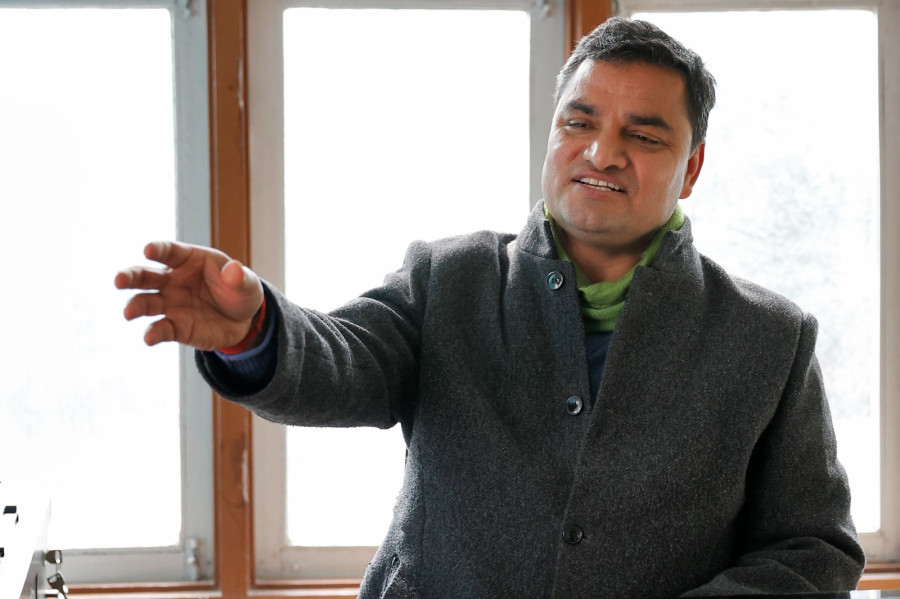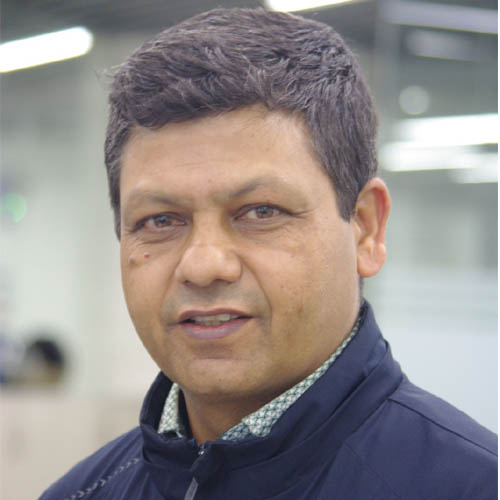Interviews
Rise of new parties good for democracy but a challenge for Congress
If the government improves its performance and undertakes result-oriented initiatives, we can’t break our understanding and ditch coalition partners.
Thira Lal Bhusal
Nepali Congress General Secretary Gagan Thapa has proposed Sekhar Koirala as the parliamentary party leader of the largest party. He reckons Sher Bahadur Deuba, the current Congress leader, has failed on both government and party fronts. The government, meanwhile, has completed a year in office. The Post’s Thira Lal Bhusal sat with Congress lawmaker Pradip Paudel to discuss these issues. Excerpts:
Last week Nepali Congress again deferred a meeting of its Mahasamiti, a vital policy-making body. Why does the party always defer such crucial meets?
I also don’t understand why it was deferred yet again. There was certainly no agenda like changing party leadership. The Mahasamiti discusses fundamental policy issues such as what the party’s position should be on crucial current national issues, how to better run the party’s organisation, and how to devise the party’s strategic policies. There was no reason for anyone to suspect ulterior motives. I don’t know why the leadership is hesitating to convene such meetings.
The impending National Assembly election has been cited as a reason.
We spoke earlier against forging alliances ahead of general elections. We argued that there should be no political syndicate and that people should be allowed to vote based on their conviction. People criticised the Nepali Congress for forging electoral alliance with communist parties. But we should be open to entering into alliances to form governments and even in elections for National Assembly seats. It wouldn’t have been an issue in the meeting. So there is no point in deferring the meeting citing the upper house elections.
If so, will you stand against an electoral alliance come 2027 elections?
Now we hold power in all three levels of government. If we do well in the government, people will vote for us. We don’t need an alliance. If we can’t improve our performance in government, no election alliance will help. People didn’t like Congress forging alliance with communists. Also, we couldn’t secure alliance parties’ votes for our candidates while we were blamed for others’ wrongdoings. We were also blamed for narrowing down voters’ choices. Therefore, the Congress will not be in favour of pre-poll alliances.
Congress President Sher Bahadur Deuba recently disclosed that the party is open to debating secularism, which was taken as a meaningful statement given the impending Mahasamiti meeting and recent pro-Hindu protests. Is Congress rethinking its political line?
Culture, traditions and values of a large section of our society are attached to the Hindu religion, which in turn is being infringed. But this problem can’t be solved by changing a constitutional provision. People should understand that the issue of Hinduism is being raised with a different purpose. If you change a constitutional provision, it may be a slippery slope. Such a move may open floodgates of demands for more amendments. As far as our party president’s statement is concerned, no one should forget that this constitution was promulgated with the help of some vital leaders, including Deuba. The constitution is just eight years old. I therefore don’t think Congress will raise the issue of Hindu state and constitution amendment as that would only complicate the things. We should seek solutions from within this constitution.
Though the Congress and the CPN-UML were the leading forces while promulgating this constitution, some of their leaders had reluctantly accepted secularism and federalism. They are now vocal against these newly-adopted concepts. How decisive are they in your party?
So far, no one has come up with any formal proposal on these issues. Therefore, these statements are informal. We can’t say how many leaders support these ideas. But their presence in the party is not decisive. Some leaders prefer to support agendas based on whims seen in the society. But it wouldn’t be acceptable, particularly for the key leaders who introduced the policies.
Will this issue be strongly raised in the Mahasamiti meeting?
The sentiments we hear on various public platforms may be reflected in the meeting. But leaders will definitely be divided. Some will say that it can be addressed from within current constitutional arrangements while others may even argue for constitutional changes. But I don’t think the meeting will make any decision on constitutional changes because that isn’t easy.
What about the issue of federalism?
It is true that it has failed to deliver and has become a financial burden. So efforts should be directed at improving its performance and reducing its expenses. Otherwise, it can’t prove its relevance. We need to downsize its political and bureaucratic structures and make it function more effectively.
The government has completed one year. How do you evaluate its performance?
As a ruling party lawmaker and central committee member of the senior coalition partner, it may not be natural for me to criticise the government. As a ruling party lawmaker, I would love to spend half an hour in a House meeting praising the coalition government, with a long list of its initiatives. But there is not much to appreciate. We are running not only the federal and provincial governments but also leading a large number of local units. So we should be able to do something substantive. If not, we have to face the music.
Of late your party leader Shekhar Koirala has been consistently saying that this government must be changed without delay. What is your view?
At present, we can’t run a government without a coalition, and the current coalition partners already have an understanding on leading the government by turn. We want improvement in delivery. If the government improves its performance and undertakes result-oriented initiatives, we can’t break our understanding and ditch it. We are ready to continue with current partners but they should improve their performance. This government can give an optimistic message by doing just a few things such as bringing Melamchi water to Kathmandu; appointing a competent academic as vice-chancellor in the Tribhuvan University; and completing the Muglin-Pokhara, Narayanghat-Butwal roads and Kathmandu Ring Road upgradation. People would have applauded the government had it genuinely probed major corruption scandals.
You were among a handful of Congress leaders people had pinned high hopes on. But even you are now being accused of failing to work properly in Parliament and party committees. How do you respond?
We aren’t perfect and I cannot boast of doing excellent work. We are trying our best but many things happen as a part of a process.
People on social media and other platforms express their wish to see popular leaders such as Gagan Thapa, Bishwa Prakash Sharma and yourself stand together on key issues and bring generational change in the party. But you seem divided on crucial moments. Why so?
It’s not that we aren’t together. We will even bring other friends on board. Along with generational change, we also need to transform the party. It requires change in leadership as well as in policy, transformation in organisation and clarity in our vision. For that, we all should join hands. Only issue-based unity can be sustained.
We see hardly any substantive change in Congress even after two popular young leaders were elected party’s general secretaries along with other emerging leaders in key positions.
The new leaders who made it to the office bearers’ positions have tried their best. But they haven’t been decisive in making key decisions. We may fault them for failing to create such a situation and we may also find weakness on the part of other friends who have failed to support them. But it’s a long process, not something that happens overnight.
Party general secretary Thapa has come up with a new proposal of electing Sekhar Koirala parliamentary party leader to displace party president Deuba from parliamentary leadership. Is it a timely proposal?
It’s not unnatural in Nepali Congress. The country’s constitution and our party’s statute allow us to do so. There is dissatisfaction against the leaders, even against us. So, anything can happen. The only thing is that it should be done when the situation is ripe instead of debating it on public platforms. However, it’s not that easy as it should be done through a process.
Many think the Congress stands to lose the most from the rise of new parties. What is your assessment?
For democracy, the rise of new parties is a good sign as it may make the democratic practices more competitive. If there is healthy and issue-based competition, that is good for the system and people get more options. But I am a Congress member. I have to think about my party. It’s true that new forces may result in more losses for our party. In the past there was only the Congress on the democratic front. Even those who didn’t like Congress candidates voted for it as they disliked the communists more. But now, other parties have entered the democratic space. People have options. The rise of new parties is better for the system but it has added challenges for the Congress. So, now we should be more progressive, more vocal against corruption, and clearer on national issues. Also, we should bring about newness in the party. For that, the leadership should change, party policies should be updated as per the changed context and our work style should improve.




 18.12°C Kathmandu
18.12°C Kathmandu




.jpg&w=200&height=120)







